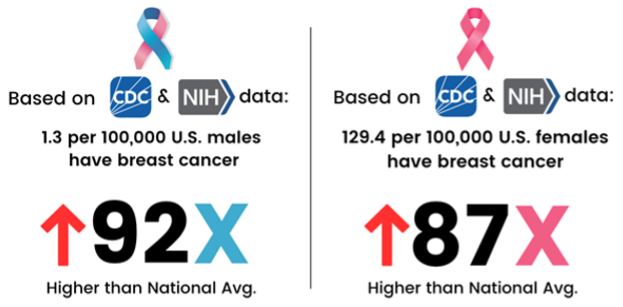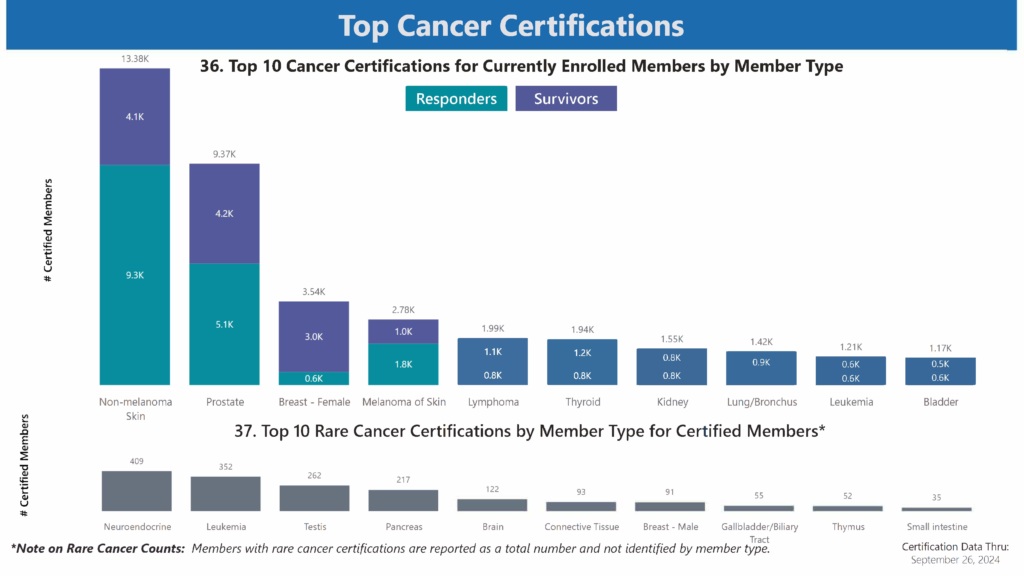Highlights
- World Trade Center Health Program data confirms growing threat of aggressive female and even rarer male breast cancer cluster.
- Breast cancer cases spike nearly 87 to 1 for women and 92 to 1 for males in the 9/11 community.
Deadline Extended to Register 9/11 Compensation Claims
11 Park Place, 18th Floor
New York, New York 10007

Recently-released data from the World Trade Center Health Program (WTCHP) reveals an exceptionally high rate of breast cancers in the 9/11 community compared with the general population. In women, the ratio can be as high as 87.04 to 1 compared to the general U.S. population, and in men the ratio is an astounding 92.30 to 1.
While female breast cancer is the second most common cancer among women in the U.S., affecting 129.4 out of every 100,000 women, in males it is one of the rarest and most misunderstood forms of cancer, impacting only 1.3 out of every 100,000 men. But data released in Q3 2024 by the U.S. Centers for Disease Control (CDC) shows that 91 male members of the 9/11 community have a confirmed diagnosis.
According to the CDC, 137,600 members of the 9/11 community have registered for the health protections provided by the WTCHP. Approximately 75.81%, or 98,590 are male. Considering general population trends, there should only be 1 male breast cancer diagnosis in the group. Instead, this data demonstrates a 9/11 cancer cluster that appears to be 92.30 times greater than that of the general U.S. population.

Women in the 9/11 community have also demonstrated an alarmingly high incidence rate for breast cancer compared to the public.
Approximately 31,430 of those in the WTCHP are women, representing 24.16% of total registrants so far, and there are 3,540 breast cancer diagnoses among them — an increase of 87.04 times versus the national average for women.
69 cancers are now recognized as linked to 9/11, including breast cancer. Those who were exposed and who have been diagnosed with any recognized condition are entitled to the benefits of the free WTCHP and, if certified with an illness, they are entitled to an award from the Victim Compensation Fund. With both programs, there is a presumption linking the World Trade Center toxins to a patient’s cancer, notwithstanding family history.

In October 2024, the WTCHP updated benefit guidelines for women to get mammograms at 40.
Sadly, according to the NIH National Cancer Institute, breast cancer in men is often diagnosed at a much later stage, often due to factors such as lack of knowledge, public education, and embarrassment. Unlike women, men are not taught to perform self-exams on their breasts, and they often miss the telltale signs.
The perceived stigma of having potentially contracted what is generally considered a woman’s disease can have the psychological impact of discouraging the reporting of symptoms. Some early cancers demonstrate noticeable signs and symptoms; however, this is not always the case with male breast cancer.
Barasch & McGarry urges all members of the 9/11 community to perform breast self-exams every month and to speak with their health care providers about the increased risk of breast cancer. Raising awareness of 9/11-related breast cancer will help to destigmatize the illness and encourage 9/11 responders and survivors to seek medical treatment promptly.
"*" indicates required fields

Hi, we are here to help if you have questions.
Leave a comment